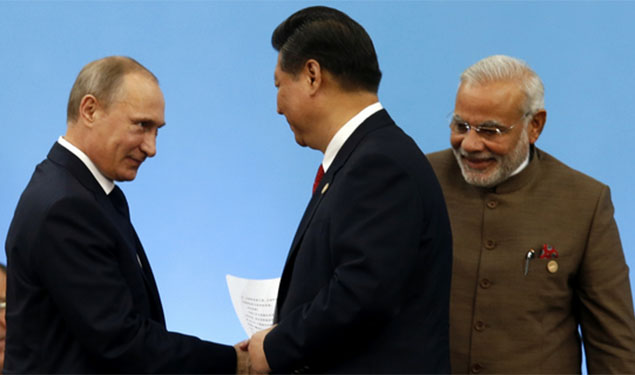Live Makkah
Live Madinah
Urdu Font Download
Latest News:
Padubidri: Fishing boat capsizes; all 7 fishermen on board rescued Alleged atrocity on lawyer: Punjalakatte SI suspended Moral policing at jewellery shop: 4 arrested Bajrang Dal activists try to assault youth, girlfriend in Mangaluru SC to hear Bilkis Bano’s plea against release of 11 convicts on 13 Dec Nusrat Noor: First Muslim Woman to Top Jharkhand Public Service Commission
Latest News:
Padubidri: Fishing boat capsizes; all 7 fishermen on board rescued Alleged atrocity on lawyer: Punjalakatte SI suspended Moral policing at jewellery shop: 4 arrested Bajrang Dal activists try to assault youth, girlfriend in Mangaluru SC to hear Bilkis Bano’s plea against release of 11 convicts on 13 Dec Nusrat Noor: First Muslim Woman to Top Jharkhand Public Service Commission
Emerging India-Russia-China relations could isolate America in trade battle: Expert

New Delhi, 27 Jun 2018 [Fik/News Sources]: Observing that the world is witnessing a kind of “reverse globalization,” renowned Indian economist Dr. NR Bhanumurthy said growing trade tensions driven by the US raising tariffs on foreign goods may lead to America's isolation by the world's emerging economies.
"India and China, with the support of Russia, could team up under the pressure of US tariffs", Dr. Bhanumurthy, professor at the New Delhi based National Institute of Public Finance and Policy, said.
“One can also read something in PM Modi's recent so-called informal visits to China and Russia,” the economist told Sputnik International in an exclusive interview.
“The recent developments during the G-7 meeting in Canada also suggest that the US appears to be getting isolated and in that case, the trilateral situation between Russia, India and China could be a win-win situation for not only these three countries but also other BRICS countries that are struggling with US tariff hikes.”
Earlier this year, US President Donald Trump imposed an import tax of 25 percent on steel and 10 percent on aluminum from several countries, including Russia, China and India. All the three opened WTO disputes over the move they see as protectionist. Moreover, Russia and India have approved mirror tariffs that are set to cover their losses due to the US levies.
Earlier this month, more than a thousand categories of Chinese products were hit by 25 percent export tariffs. Beijing immediately retaliated with a 25-percent tariff on 545 US products worth $50 billion. The step triggered another wave of threats from Trump.
Dr. N.R. Bhanumurthy urged parties to revive the regional trade agreements which have been neglected for some time. Apart from BRICS, India is a member of the South Asian Association for Regional Cooperation (SAARC) that includes Afghanistan, Bangladesh, Bhutan, Nepal, the Maldives, Pakistan and Sri Lanka.
“As we have seen in the past that globalization has led to the gains to all the countries, during the reversal we might have to face exactly the opposite of this. One should not be surprised that the current president in the US is clearly looking for large-scale protectionism especially during the run-up to the next elections", he said.
The economist also said that further protectionist steps against India could have an adverse impact on its growth, as the country’s corporations heavily depend on exports and imports.
“Trade used to contribute nearly 20-25 percent of GDP especially during the high growth period in the mid-2000s,” Dr. Bhanumurthy, who significantly contributes to policy reforms at all levels of the Indian government, said.
“The service sector, especially the IT sector, would take a big hit. We have seen how some of the software giants promised the US that they would recruit locally for their global operations", he added.
About the impact of the ongoing trade war on Indian firsm, he said, "In the context of declining trade with advanced countries, one is clear that it would have an adverse impact on growth. Trade used to contribute nearly 20-25 percent of GDP especially during the high growth period in the mid-2000s. The Indian firms depending heavily on exports and imports would be affected adversely."
"The service sector, especially the IT sector, would take a big hit. We have seen how some of the software giants promised the US that they would recruit locally for their global operations. All these will have an impact on employment [and on the] profitability of companies that are a part of global chains. But most importantly, as trade is expected to improve productivity and welfare, any decline in trade would have an adverse impact on both of these", he added.
Prayer Timings
| Fajr | فجر | |
| Dhuhr | الظهر | |
| Asr | أسر | |
| Maghrib | مغرب | |
| Isha | عشا |







